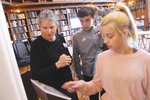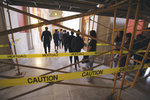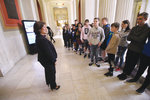By JOHN HOWELL Eighth graders aren't especially interested in laws unless it applies to them, like you can't use your cell phone during class. So, it wasn't all that surprising that Veterans Memorial Middle School students didn't have a lot to say when
This item is available in full to subscribers.
We have recently launched a new and improved website. To continue reading, you will need to either log into your subscriber account, or purchase a new subscription.
If you are a current print subscriber, you can set up a free website account by clicking here.
Otherwise, click here to view your options for subscribing.
Please log in to continue |
|



Eighth graders aren’t especially interested in laws unless it applies to them, like you can’t use your cell phone during class.
So, it wasn’t all that surprising that Veterans Memorial Middle School students didn’t have a lot to say when Lane Sparkman asked how they would have felt about laws imposed by some of Rhode Island’s first settlers.
But Sparkman, associate director of education in public programs in the Department of State, was undaunted by the seeming lack of interest. In front of the students gathered in the State House library Tuesday morning were copies of yellowed documents drafted nearly 400 years ago. From a screen projection, she read of a law forbidding Native Americans from cutting down trees on Aquidneck Island.
She asked what that law might mean to the Indians, how would that affect them? Now trees aren’t cell phones, but the students started putting themselves in the place of Native Americans and what such a restriction would mean.
“They wouldn’t have wood to build shelters,” suggested one student. Others volunteered the law could impact the Native Americans’ ability to cook and heat, make tools and weapons and clear land to grow crops.
Sparkman moved on to another set of laws imposed by early settlers, including the prohibition of setting forest fires and killing deer or boar. The law on forest fires seemed to make sense initially until Sparkman explained the fires were used to clear land and consume dead underbrush that could be a threat in an uncontrolled fire. She needn’t explain what the loss of deer and boar might mean to the natives. Food was on top of the list, followed by the loss of hides for clothing and antlers for tools.
Sparkman didn’t need to explain why the Indians chaffed under such laws nor why tribes formed alliances to fight the colonists in what she said is the country’s deadliest war given the number of people who lost their lives in relationship to the population.
She asked the students for the name of the war that lasted 18 months. The Revolutionary War and the Civil War were suggested. Sparkman prodded for additional suggestions before revealing the answer: the King Philip War of 1675. She said the Native American population plummeted as thousands died, moved away, became indentured servants and sold as slaves to work in Caribbean sugar plantations.
Sparkman’s presentation was part of a program initiated in partnership with the Secretary of State's office, Roger Williams National Memorial and Tomaquag Museum. It is funded by the Carter Roger Williams Initiative at the Rhode Island Foundation. A foundation grant pays for busing students to and from the State House. The morning-long visit to the State House by more than 100 Vets students included a tour of the capital with detailed information about the building, statues, paintings and inscriptions.
As students craned to view the paintings on the interior of the dome, Kevin O’Donnell talked about Roger Williams and his belief in the freedom to practice religion. He then asked if the students could spot the tallest man, wearing a brown coat and standing in an assembly of people depicted in the mural. Some students pointed and nodded.
O’Donnell then asked whether any of the students knew what a yarmulke is. Hands shot up. Could they tell what religion the tall man practiced? More hands shot up.
Nick Domings, public information officer for the Department of State, said the program is tailored for grades 4 through 12 and is offered free to all schools in the state.
“Anyone [class] can come. The costs are covered. Just ask,” he said.
Tours are usually scheduled on Tuesday and Thursdays.
Because of renovations to both the House and the Senate, students don’t have the opportunity to tour those chambers, sit in the seats of legislators and even cast votes. The students, however, were taken into committee rooms where they get a feel for procedures with mock sessions.
Secretary of State Nellie Gorbea visited with the students. Saying how she loves the job, Gorbea said, “I get to make government work well for people.” She talked briefly of the state’s great history and its accomplishments such as the freedom of religion. She also acknowledged some of the not so great things of Rhode Island, including its role in the slave trade.
Overall, she feels Rhode Islanders are unaware of their rich history and if they had a better knowledge of accomplishments they would have a better view of the state. She feels they would also understand they have the power to make change.
As for what she said, Gorbea called on students to “respectfully and constructively contribute…and to become active and engaged citizens of Rhode Island.”
Comments
No comments on this item Please log in to comment by clicking here